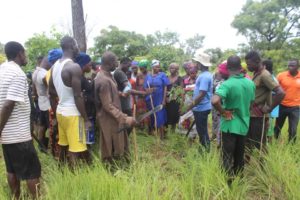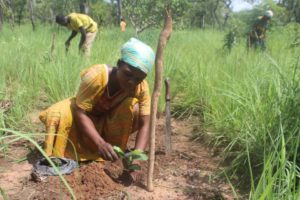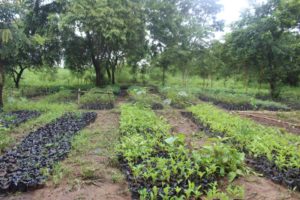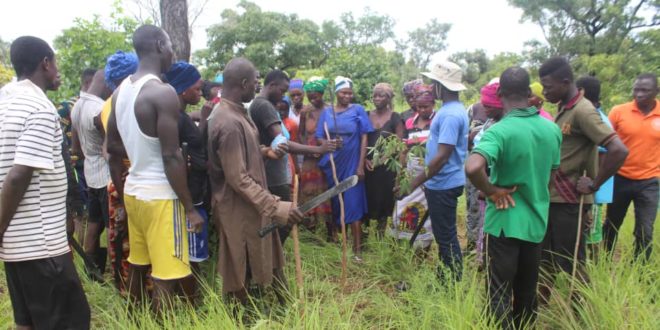3 communities in the West and North Gonja districts Of the Savannah Region have planted 2100 indigenous trees to rehabilitate the degraded woodlands to improve biodiversity conservation.
The Savannah eco-zone is gradually losing its tree cover and wildlife as a result of perennial bushfires, unsustainable charcoal production, uncontrolled grazing coupled with both legal and illegal logging and bad farming practices. According to a recent report by U.S-based World Research Institute Ghana’s forest cover loss increased by 60 percent from 2017 to 2018 which predominantly occurred in protected areas.
Undoubtedly, the degrading savannah woodland has resulted in loss of soil fertility with the subsequent effects of low agriculture productivity, erratic rainfall pattern, rise in temperature and unsustainable livelihoods.
To establish an effective natural resource management regime and protecting the ecosystem, the 3 communities; Murugu, Kpulumbo and Yazori through support from A Rocha Ghana,a non- governmental organization under the Econobio project, Shared Resources Joint Solution programme and Global Shea Alliance have planted 2,100 indigenous trees on 15.69 acre land.
The Need for Enrichment Planting
Trees remove the amount of carbon dioxide and other greenhouse gases in the atmosphere, hence provide optimum temperature by releasing more oxygen to sustain life on earth. The other benefits of trees include provision of food and microclimate for agriculture as well as serving as habitat for several arboreal species.
Mr. James Bani, the CREMA secretary for Murugu-Mognori CREMA highlighted that there are lot of challenges facing the communities as a result of unsustainable exploitation of their resources. He stated “We are losing more trees, the land is been degraded and it is affecting our farming activities.
According to Mr Bani, previously the community could predict the rainfall pattern and that guides them on when and how to go about their farming activities and therefore advocated the need to plant more trees to reverse the devastating effects of climate change.
Some members of the CREMAs attested to this, which in the nutshell indicated that the importance of ecosystem to the survival of humans cannot be overstated.
Briefing the communities, Mr Isaac Kofi Ntori, a Project Officer of A Rocha Ghana indicated that the ecosystem is very crucial for sustaining life on earth; thus providing a broad variety of services and subsistence requirements including food, water, air, medicines, etc.
He stressed that without these and many other ecosystem goods and services, life would not be possible. Mr. Ntori advised the communities to enhance their collaboration with institutions and stakeholders to safeguard the environment since the recent surge in rosewood logging, uncontrolled charcoal production and other environmental unfriendly activities have made the landscape losing its ecological integrity.
Preparatory Activities
Ecosystem rehabilitation or restoration is a challenging long-term endeavor that requires thoughtful planning, implementation and monitoring. The core objective of the restoration activity is to improve the savannah woodland and agroforestry management practices as well strengthen tree-based income generation for local communities.
A Rocha Ghana, Form International and Form Ghana have developed a medium sized nursery close to Mognori, a fringing community of Mole National Park as the start for large scale landscape restoration of the Savannah woodland. Currently the nursery contains over 40,000 seedlings of shea (Vitellaria paradoxa) and other indigenous tree species including Afzelia africana, Parkia biglobosa, Pterocarpus erinaceus, Ceiba pentandra, Khaya ivorensis and Baobab (Adansonia digitata)
Some community members have also been trained and assisted to be caretakers of the nurserys. The training covered plant production, seed supplies, nursery techniques, quality assurance and maintenance work.
Training and Enrichment Planting
to ensure that communities are acquainted with knowledge and skills on tree planting and maintenance in the perspective of landscape restoration A Rocha Ghana conducted trainings on planting of tree seedlings for Kpulumbo, Murugu and Yazori communities from the 24th – 26th August, 2019.
During the training Mr. Ntori passed the participants through the planting manual of which 124 community members including the Community Resources Management Committees were trained from the 3 communities.
The trainings were followed by a practical section which involved the enrichment planting of native species at degraded sites in the community.
During the planting, the team from A Rocha Ghana assisted the participants to prepare the site and also explained to them the planting system and patterns as well as the planting distance. In all a total of 2,100 seedlings were planted on 15.69 acre land (Kplumbo-3.45 acre, Murugu- 9.1 acres and Yazori- 3.14 acres) whiles 80 seedlings were given to three community members to plant in their farms in Kpulumbo. The seedlings planted included; Dawadawa (Parkia biglobosa), Mahogany (Khaya ivorensis), Papao (Afzelia Africana), Kapok (Ceiba pentandra), Baobab Adansonia digitata and Rosewood (Pterocarpus erinaceu).
The communities were happy to receive the training and also their involvement in the enrichment planting. They all expressed their gratitude to A Rocha Ghana and the Partners for their continual support towards sustaining the landscape as well as providing seedlings to rehabilitate the degraded woodlands.
They also pledged their commitment to maintain and monitor the growth of the planted seedlings as well as replicating the enrichment planting in the years ahead.
The long-term vision of the enrichment planting is to restore and sustain the savannah woodlands and shea parklands by implementing improved land use systems and businesses that enhance the provision of agricultural produce, shea butter, other non-timber tree products (fruits, dyes, bark, honey etc.), building materials, timber and fuelwood.



Source: Thepressradio.com/Zion Abdul Rauf
 Home Of Ghana News Ghana News, Entertainment And More
Home Of Ghana News Ghana News, Entertainment And More




